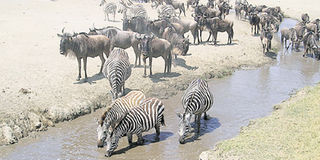Rangers matter: They are the glue that binds our conservation work

Zebras and gnus drinking water after walking a long distance from Masaai Mara (Kenya) to Serengeti National Park. PHOTO | FILE
What you need to know:
Experience shows us that for efficient wildlife management, it is critical that communities that live in and in the vicinity of national parks are engaged, empowered and involved in wildlife protection and in the benefits that parks and wildlife can bring to local communities.
In April this year, the world was charmed by a series of ‘selfies’ of mountain gorillas and park rangers in the DR Congo’s Virunga National Park. The photos were a heart-warming reminder of the important work rangers do to protect this endangered species. What the images didn’t convey was the risks these rangers take every day to ensure mountain gorillas are safe from poachers.
Almost exactly a year before the selfies went viral, six park rangers and a driver were gunned down in Virunga, the worst attack to date in a Park where an estimated 170 rangers have been killed over the past two decades. In March this year, another Virunga ranger was killed just weeks after the Park reopened to tourists following attacks in 2018.
In fact, according to the International Federation of Rangers, globally, more than 100 rangers die annually in the line of work.
As the East African region steps up efforts to curb poaching and restore endangered wildlife populations, the work of rangers will be more important than ever. Earlier this month, Kenya’s Ministry of Tourism and Wildlife announced plans to set aside over 750 acres of forest for the conservation of the Mountain Bongo. Also this month, the Uganda Wildlife Act came into force, introducing stiff penalties for wildlife crime involving endangered species. In Tanzania, the presidency recently announced that elephant and rhino populations in the country have begun to rebound following a government crackdown that broke up criminal networks involved in poaching.
Experience shows us that for efficient wildlife management, it is critical that communities that live in and in the vicinity of national parks are engaged, empowered and involved in wildlife protection and in the benefits that parks and wildlife can bring to local communities.
After all, an empowered and engaged community, that benefits from wildlife conservation, will be the first to protect the conservation efforts undertaken.
As poachers have militarised and become elements in international crime networks, the work of rangers and communities to prevent wildlife crime is tough and often deadly. And despite ongoing efforts to curb the poaching menace, it continues to threaten vulnerable species. The last remaining male northern white rhino in the world died last March in Kenya, leaving the sub-species facing extinction.
If we want to do better at conservation, we must do better by our rangers, while also enhancing community empowerment, outreach and engagement.
The United Nations Environment Programme (UNEP) has long supported Member States in strengthening ecosystem resilience and building sustainable wildlife-based economies. In June, UNEP, together with the African Union, convened the inaugural African Wildlife Economy Summit in Victoria Falls, Zimbabwe, which aimed for a radical shift in the way the continent manages its wildlife economy.
One of the key outcomes of this Summit was a declaration by community representatives demanding greater inclusion in the continent’s wildlife management and revenues. As humans and wildlife continue to compete over scarce resources, we are seeing increased human-wildlife conflict – according to Kenya’s Tourism Ministry, in 2018 alone,77 people and 735 animals were killed in human-wildlife conflicts.
From the Intergovernmental Science-Policy Platform on Biodiversity and Ecosystem Services (IPBES) report earlier this year, we know that three-quarters of land has been significantly altered by human actions,but these trends have been less severe or avoided in areas held or managed by indigenous peoples and local communities.
Employing rangers from local communities living in protected spaces is an important way to resolve these conflicts – communities can learn wildlife management skills, earn an income from the wildlife-based economy and have a firm stake in protecting endangered species.
In order for global campaigns to protect wildlife to succeed, it is important to remember that every ranger employed to safeguard our wild heritage and keep our natural systems functioning must be provided with the proper training and equipment to do the job. They need fair wages and also psychological support to deliver their mandate.
They are on the frontlines of our efforts to save our planet’s wild treasures.
Inger Andersen is the executive director of the United Nations Environment Programme (UNEP)




